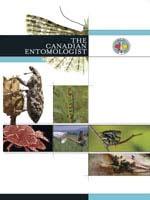Female wheat midges, Sitodiplosis mosellana (Géhin) (Diptera: Cecidomyiidae), were provided with wheat spikes, Triticum aestivum L. (Poaceae), for oviposition while being exposed to air that had passed over wheat spikes of contrasting genotype or growth stage. Spikes of postanthesis ‘Roblin’ and preanthesis ‘Key 10’ are known to deter oviposition. Volatiles emitted by these spikes suppressed oviposition on preanthesis ‘Roblin’, which is preferred for oviposition. Volatiles emitted by spikes of preanthesis ‘Roblin’ did not increase oviposition on preanthesis ‘Key 10’. Reduced oviposition on a resistant genotype and on a deterrent growth stage of wheat is consistent with production of deterrent volatiles rather than a lack of stimulatory volatiles.
How to translate text using browser tools
1 August 2011
Volatile Compounds from Non-Preferred Wheat Spikes Reduce Oviposition by Sitodiplosis mosellana
A.H. Gharalari,
M.A.H. Smith,
S.L. Fox,
R.J. Lamb
ACCESS THE FULL ARTICLE
It is not available for individual sale.
This article is only available to subscribers.
It is not available for individual sale.
It is not available for individual sale.

The Canadian Entomologist
Vol. 143 • No. 4
August 2011
Vol. 143 • No. 4
August 2011




